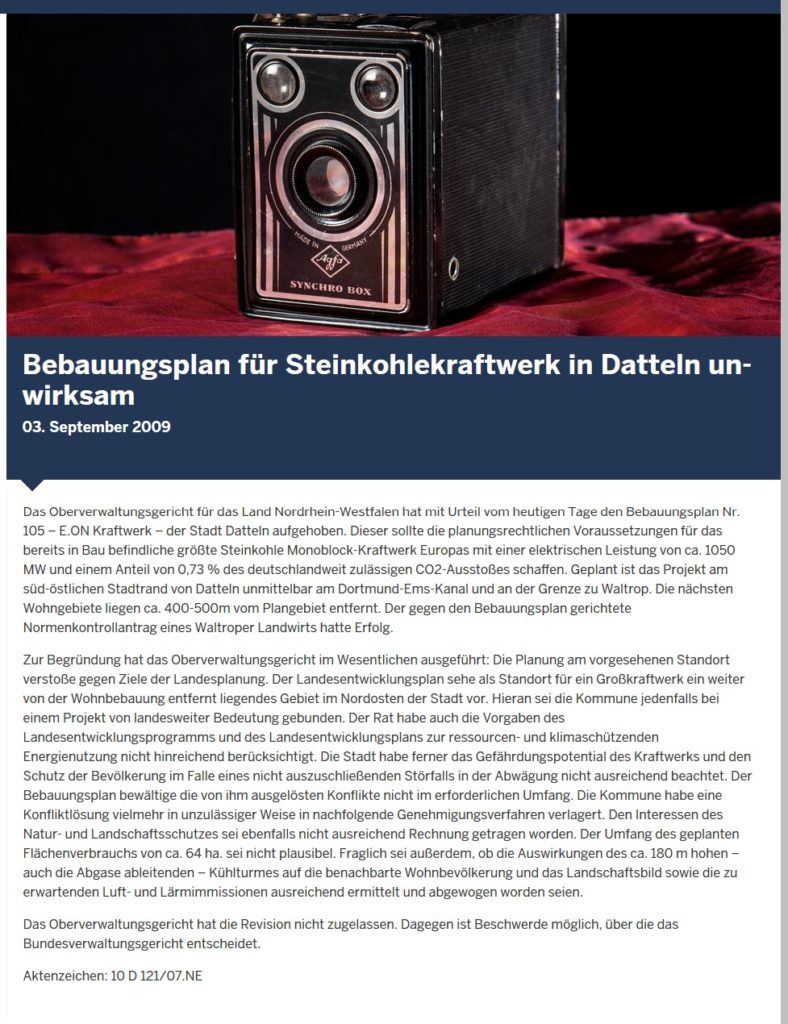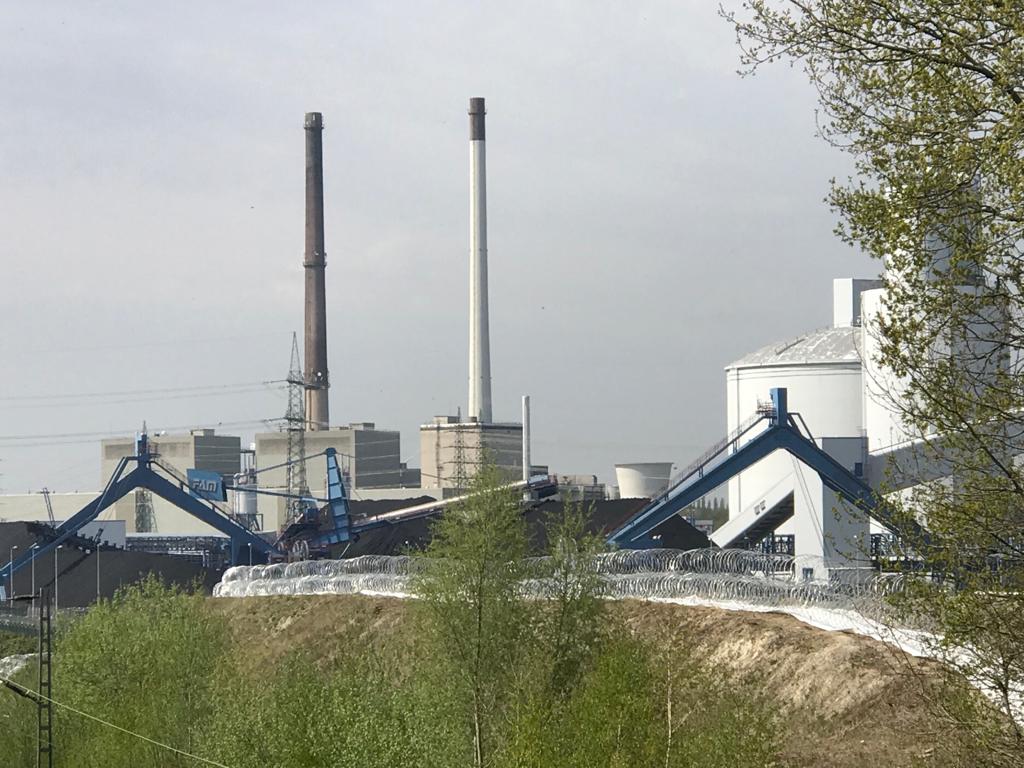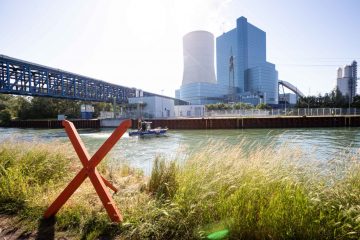On lying politicians and perversions of justice

Constructing a power plant at a distance of 400m from a residential area is rarely a good idea. Datteln 4 should not have been built in this place since the land-use planning had designated another location for the power plant. Furthermore, the planning has been violating nature conservations laws since its beginning, according to a ruling of the supreme court. This is why Datteln 4 is often referred to as an illegal construction.elfach auch als Schwarzbau bezeichnet wird.
With the first application for building a power plant the legal disputes on Datteln 4 began. In order to explain the situation concerning laws and planning regulations, we need to go back a long way:
Land use planning in Germany
Land use planning is strictly regulated in Germany so that houses are not standing around randomly and wastewater treatment plants are constructed next to kindergartens. There is a clear hierarchy, ranging from general to particular, as indicated in the Law on Regional Planning and in Federal State Planning Laws:
1. Federal State Development Plans (Landesentwicklungspläne) and Federal State Development Programmes(Landesentwicklungsprogramme) are issued by the Federal State Planning Authority (in the Federal State of North Rhine-Westphalia (NRW) under the Minister-President‘s Office until 2017, after this merely under the Ministry of Economic Affairs) and passed by the Landtag State Parliament. The Federal State Planning Authority is prescribing general aims and principles (e.g. area-conserving development of settlements) by law but also decides on spatial arrangements, e.g. designated areas for power plants, recreational sites or nature.
2. Regional Plans (Regionalpläne) are issued by the District Governments (in the case of Datteln, this is the Regionalverband Ruhr). They are obliged to adhere to all guidelines of the Federal State Development Plans. They are free to choose how to do so and may also apply for exemptions.
3. The Structure Plans (Flächennutzungspläne) are prescribed by municipalities. They affect the whole area of the municipality and show a more detailed plan of where buildings may be erected. There is no absolute need to pay attention to them as they are not legally binding.
4. Site Plans (Bebauungspläne) are valid for a designated area within a municipality. They are drawn up and decided on by the municipality.
Judging by a hierarchical point of view, Federal State, District Governments (in this case Regionalverband Ruhr) and municipality are involved. Because the guidelines are legally binding, comparable to a law, lower level authorities need to adhere to the guidelines of higher ones.
Decision based on weighing up
Bebauungspläne (Site Plans) are political decisions. There is no legal right to be granted approval for construction projects.
Policymakers are obliged to examine and weigh up different perspectives. In order to do so, all factors need to be included, eg. objections of citizens, composition of the surrounding nature. In addition to that, it needs to be checked whether there are more suitable sites for the project.
Approvals
In contrast to e.g. living accommodations, fossil fuel-powered power plants need a permission according to emission laws, i.e. a permission to be allowed to emit "air pollution, noise, vibration and similar processes". Following the municipality’s approval of the Site Plan, the operators are entitled to receive a building clearance. To do so, operators need to meet emission limits laid down by the law.
In addition to the permission according to emission laws, Datteln 4 needs a permission for the channel harbour, which is the place where the hard coal is to be delivered, as well as permissions for discarding wastewater to Deinebach stream or Lippe river.
Land-use planning in case of Datteln 4
In 2006, E.ON applied for the first time to build and legally operate a new power plant. To be able to do so, the Regionalverband Ruhr District Government has changed the Regional Plan so that Datteln 4 could then be constructed. In the beginning of 2007, the City of Datteln declares the Site Plan no. 105 and the District Government granted the required approval. The legal basis for the construction was ready, or so they thought.
Despite numerous objections from citizens, authorities held the view that a power plant could be lawfully constructed at this place. One could speculate whether authorities were misjudging the situation or whether they believed it to be enforced, thinking that "if there is no law against it, we need not worry". Judgement of the court followed at a later stage.
"Complete failure to weigh up"Vollständiger Abwägungsausfall“
Parts of the permission procedures have not been followed, including the Federal State Development Programme from 1989, the Federal State Development Plan from 1995, the Federal Anti-Pollution law, and others. After the lawsuit filed by a farmer, the Münster Higher Administrative Court (Oberverwaltungsgericht) declared Site Plan no. 105 and the change of the Regional Plan ineffective and repealed the Site Plan in 2009. Ensuing complaint by E.ON and the City of Datteln, the decision was confirmed by the Federal Administrative Court (Bundesverwaltungsgericht) named several reasons for this:
– The guidelines on location in the Federal State Development Plan have not been taken into account. Originally, a place 5km to the north of the chosen location had been planned.
– Guidelines concerning the energy source: Domestic energy sources should be used. preference should be given to renewable energies.
– Using strong wording, they describe the distance of less than 400m to the nearest residential area a "concerning safety and security matter, a complete failure to weigh up has occurred."
– Taking general interests of nature conservation, landscape conservation and soil protection into account, the flora-fauna-habitat (FFH) pre-investigation is said to be faulty.

Attempt at a cure
Following the extensive decision, construction has stopped at many places within the construction site. E.ON and policymakers did not want to acknowledge defeat but started various attempts at a cure:
– The City of Datteln drew up Site Plan no. 105a
– The Federal State Government (CDU/FDP) changed the Federal State Development Programme by removing the section on climate protection which said in 2009, “[…] striving for that chiefly domestic and renewable energy sources should be used.”
– Furthermore, the Federal State Development Plan should be changed in 2010. In order to subsequently create a basis for the construction of the new power plant, section D.II “Energy supply” and designation of locations of power plants were to be changed. The new government (SPD/Green Party) has dismissed these changes.
Because the legal basis was still lacking, the construction did not continue. Moreover, the Münster Higher Administrative Court declared the preliminary decision from 2007 on emission laws for the power plant to be illegal in 2012. They say that it was not detailed enough and Site Plan no. 105, the basis for the preliminary decision, had been repealed by court. Besides that, the FFH compatibility investigation was decided to be unsatisfactory. This court decision has been confirmed by the Federal Administrative Court (Bundesverwaltungsgericht) after complaints filed by E.ON and the Federal State of NRW.
New attempts
Regionalverband Ruhr District Government, the relevant authority, passed proceedings to obtain permission to deviate from a planning objective in 2013. This means that deviations from Federal State Development Plan in favour of the power plant are possible, i.e. that deviation is allowed in terms of location and guidelines which lay down the usage of domestic energy sources.
Based on this, a new change of the Regional Plan was decided which forms the foundation for the new Site Plan no. 105a. The District Government in Münster allowed the construction to continue in 2016 and issued a new permission concerning emission laws in the following year.
Perversion of justice
The original permissions were dismissed by the highest German courts for being illegal. The construction has been carried out based on these original permissions. The ensuing efforts by E.ON, local and federal state politicians to create a legally stable basis for constructing a new power plant do not change anything about the physical existence of the power plant and its unchanged impact on human beings and nature.
The BUND NRW has raised its voice on several occasions to call out their attempts to adapt the law to the demands of the power plant, which was only enabled through the violation of law, to be a perversion of justice.

Current issues
Even today, the power plant has not been granted final legal permission. Various charges are pending on 3 levels:
- Individuals and BUND take legal action against Site Plan 105a for the same reasons they stated against Site Plan 105 (too close to residential areas, extreme disturbance of nature reserves, and more.)
- BUND is charging against the permission concerning the emission laws. As was the case for Site Plan 105 (a case which BUND has won), BUND claimed that the assessments drawn up by the experts of the power plant operator were incorrect.
- BUND takes legal action against the permission to operate a channel harbor and to transpose a stream through the power plant‘s facilities.
In case of the opponents of the power plant winning the case, it is very likely to stop the operation of the power station. In contrast to this, Uniper would need to win all the cases in order be to lawfully continue operating the power station.
Normally, charges have suspensory effects. In case of taking legal action against a project, normally it must not be sustained until it is decided on the case. However, the relevant authority may annul the suspensory effect. In case of Datteln 4, this has been done several times by the Münster District Government. Despite 3 trials are still to be held, the power station is allowed to go on stream, possible injustice and infringements of the law are ignored.
Lies of politicans
A curious scene took place at the presentation of the Law on Coal Phase-out during Federal Press Conference with minister for economic affairs Altmaier on 29 January 2020. Altmaier stated, assertively: "Finally, the operators of Datteln 4, i.e. former E.ON and today Uniper, have passed through all the official channels and won, and now have the right to ensure that this power plant will go on stream."
Yet, the opposite is the case. Operators and policymakers have lost almost all cases. A detailed listing of the legal history of the power station including all court decisions plus links and references can be found here. here. zu finden.
Relation
The infringements of the law are just one argument out of many against the power station. Even if it had a legally indisputable permission and would not being charged against, it would still destroy both the climate and our basis of existence anyway. The legal inconsistencies should not be the most striking argument, but it is interesting to see how policymakers, administration and large companies are acting in concert as they attempt to pervert valid laws. Among other things, it demonstrates the significance of separation between powers in Germany.
Stand: 05.08.2020


